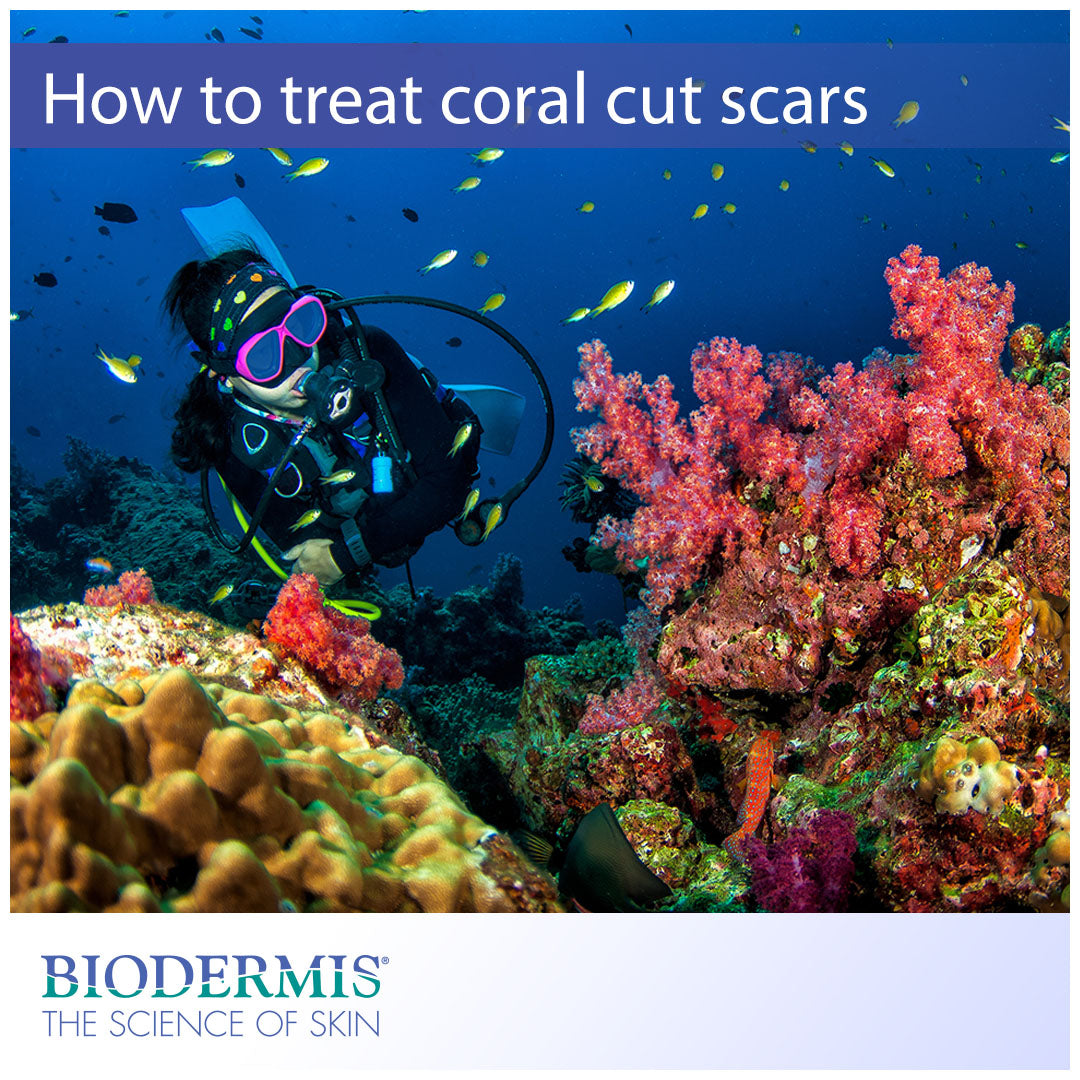With summer fast approaching and people planning their family trips to the beach, it’s important to prepare for any accidents that may happen along the way. One of the most common ocean injuries that occur during swimming, surfing, or scuba diving are cuts from coral reefs. Coral cuts can be particularly dangerous because they have a high risk of becoming infected due to pieces of the coral’s exoskeleton getting stuck in the wound. A coral cut should be treated immediately by first being cleaned out and then covered with a bandage or gauze. If the wound gets infected, antibiotics may be needed to assist in recovery. In some cases, coral cuts can lead to scarring. Luckily, with proper wound care and the right scar management products, you can significantly reduce the scarring that results from coral cuts.
Continue reading to learn more about coral cuts and how you can be prepared in case one of these accidents happens on your summer vacation.
Being mindful of coral
When people go scuba diving to explore the vast underwater ecosystems that live near ocean coasts around the world, they may come across a beautiful array of coral. What people usually see are the colors and shapes of the coral’s exoskeleton (hard outer body). A coral’s exoskeleton is often hard and pointy, making it a good defense mechanism against marine predators. The inside of coral consists of the actual animal called a polyp. A polyp is an invertebrate (without a spine) with a soft, squishy body and tentacles. Coral are biologically related to jellyfish and sea anemones. Without their hard exoskeletons, coral would be an easy meal for most predatory fish swimming in the ocean. Sadly, due to climate change and human activity, many coral reefs around the world are dying off. That's why it's so important to take precautionary measures and preserve these beautiful ecosystems for future generations to enjoy.
Continue reading to learn more about coral cuts and how you can be prepared in case one of these accidents happens on your summer vacation.
Being mindful of coral
When people go scuba diving to explore the vast underwater ecosystems that live near ocean coasts around the world, they may come across a beautiful array of coral. What people usually see are the colors and shapes of the coral’s exoskeleton (hard outer body). A coral’s exoskeleton is often hard and pointy, making it a good defense mechanism against marine predators. The inside of coral consists of the actual animal called a polyp. A polyp is an invertebrate (without a spine) with a soft, squishy body and tentacles. Coral are biologically related to jellyfish and sea anemones. Without their hard exoskeletons, coral would be an easy meal for most predatory fish swimming in the ocean. Sadly, due to climate change and human activity, many coral reefs around the world are dying off. That's why it's so important to take precautionary measures and preserve these beautiful ecosystems for future generations to enjoy.
Snorkelers and scuba divers shouldn’t swim too close to coral; the hard, spiny exoskeletons can rip through swim gear and puncture skin. Coral reefs are also home to many aquatic animals so it’s advised not to disturb these natural habitats—you may awaken something even scarier (like a moray eel). Some species of coral contain nematocysts which are specialized cells with barbed threads that contain poison. These poisons are usually not deadly but they can cause extreme pain to the victim—just another reason to stay away from coral! If you are cut by a coral while swimming or scuba diving, you should get out of the water immediately to avoid exposing your open wound to pathogens floating in the water.

Clinically-proven scar therapy
If you do sustain a coral cut that penetrates the dermis (middle) layer of skin or deeper, scarring is likely to follow. Wound infection, if it occurs, can lead to a delayed skin repair response and cause abnormal scarring in the future. To reduce scarring, it’s advised to use topical silicone gel recommended by most surgeons and dermatologists today. Topical silicone should be applied as soon as your wound has healed, so long as there’s no more bleeding or scabbing. If you received stitches for your wound, they should be fully dissolved or removed prior to using topical silicone.
Medical silicone works through the mechanisms of dermal hydration and collagen regulation. By fully encapsulating the scar bed, moisture is retained at the site, creating an optimal environment for scar healing. This perfect environment, otherwise known as homeostasis, normalizes collagen synthesis, which is often overproduced when the skin is damaged, leading to raised, discolored scars. When the collagen is brought to a normal level with the help of silicone, scars will heal in a more desirable way by blending into the surrounding healthy tissue. Silicone products can be purchased without a prescription through your physician or online at Biodermis.com.
Clinically-proven scar therapy
If you do sustain a coral cut that penetrates the dermis (middle) layer of skin or deeper, scarring is likely to follow. Wound infection, if it occurs, can lead to a delayed skin repair response and cause abnormal scarring in the future. To reduce scarring, it’s advised to use topical silicone gel recommended by most surgeons and dermatologists today. Topical silicone should be applied as soon as your wound has healed, so long as there’s no more bleeding or scabbing. If you received stitches for your wound, they should be fully dissolved or removed prior to using topical silicone.
Medical silicone works through the mechanisms of dermal hydration and collagen regulation. By fully encapsulating the scar bed, moisture is retained at the site, creating an optimal environment for scar healing. This perfect environment, otherwise known as homeostasis, normalizes collagen synthesis, which is often overproduced when the skin is damaged, leading to raised, discolored scars. When the collagen is brought to a normal level with the help of silicone, scars will heal in a more desirable way by blending into the surrounding healthy tissue. Silicone products can be purchased without a prescription through your physician or online at Biodermis.com.
Biodermis is an innovative market leader with 30 years of expertise in the medical silicone industry. Visit Biodermis.com today to explore a complete range of scar management and post-operative care solutions.
PHYSICIANS AND MEDICAL PROFESSIONALS: REFER OR RESELL?
Biodermis offers custom tailored referral programs designed to simplify and reduce the cost of your patients' post-op care. Additionally, we offer professional pricing if you opt to retail our products. Give us a call at 800.322.3729, and we will be happy to provide additional details on these programs.



